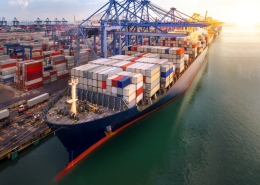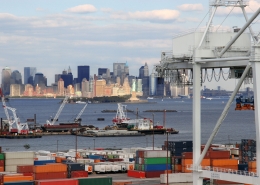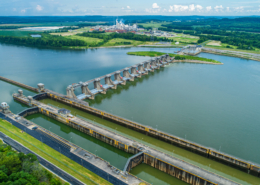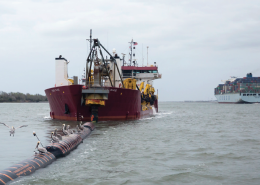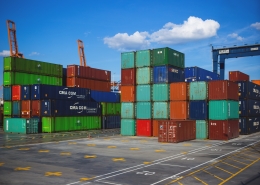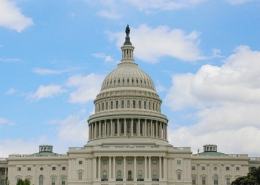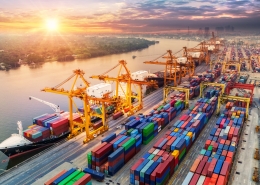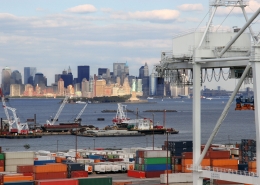James Madison is often referred to as the “Father of the Constitution.” He helped draft the document and then (along with Alexander Hamilton and John Jay) wrote a series of letters, known as the Federalist Papers, urging the states to support and ratify it. He later served as the fourth U.S. president between 1809 and 1817.
In December 1815, President Madison gave his annual address to Congress, His remarks were similar to a modern State of the Union address in which presidents outline their goals and propose ambitious undertakings.
He called on Congress to authorize the funding and construction of national roads and canals, arguing that the economic benefits of these improvements would far outweigh their costs. The internal improvements, as they were known at the time, would “honor the government” and bind the states more closely together.
Madison said it was best for the federal government to take on this role: “Whilst the States individually, with a laudable enterprise and emulation, avail themselves of their local advantages by new roads, by navigable canals, and by improving the streams susceptible of navigation, the General Government is the more urged to similar undertakings, requiring a national jurisdiction and national means, by the prospect of thus systematically completing so inestimable a work.”
He warned in language that can be interpreted as either requiring a constitutional amendment or the need to delicately craft legislation so that it would pass constitutional muster: “any defect of constitutional authority which may be encountered can be supplied in a mode which the Constitution itself has providently pointed out.”
The House and Senate subsequently passed legislation, the Bonus Bill of 1817, to fund “constructing roads and canals and improving the navigation of watercourses.” The bill’s champion, Congressman John C. Calhoun, drafted the legislation so that it did not specify which projects would get aid. This was intended to maximize support so that every congressman would remain hopeful that their district would directly benefit.
The House added a late amendment to distribute the funds to the states based on population and another amendment that required the states to approve projects built within their jurisdiction. Calhoun tried to prevent both amendments from passing because he feared that it would take away the ability of the federal government to create a national integrated system.
On March 2, 1817, Calhoun visited the President and his wife Dolly at their residence at the Octagon House in D.C. (The White House was getting rebuilt since it had been burnt down by the British during the War of 1812). The Madisons were getting ready to move back to their Virginia plantation because James Monroe was set to be sworn in as president two days later.
The historians, David S. Heidler and Jeanne T. Heidler, write “Calhoun chatted politely with the Madisons, wished them well, and prepared to leave. As Calhoun walked toward the door, Madison called to him. The president seemed uncomfortable and clearly had something on his mind as he accompanied Calhoun toward the exit. After a pause, he hesitantly said that he planned to veto the Bonus Bill because he thought it unconstitutional. The information stunned Calhoun. All of his hard work had been carried out on the assumption that the president wanted a bill authorizing internal improvements, and now with one in hand he was going to strike it down.”
In Madison’s veto message, his last official act as president, he wrote, “The legislative powers vested in Congress are specified and enumerated in the eighth section of the first article of the Constitution, and it does not appear that the power proposed to be exercised by the bill is among the enumerated powers, or that it falls by any just interpretation within the power to make laws necessary and proper for carrying into execution those or other powers vested by the Constitution in the Government of the United States.”
The president who had helped write the constitution was clear in his veto message. Roads and canals were of great importance, and could help the nation prosper. While the federal government could allocate funds, it could not construct its own roads and canals. (For an explanation of why the National Road had passed constitutional muster during Thomas Jefferson’s administration, see this article.)
In the 20th century, the U.S. Supreme Court interpreted the Constitution differently. In a 1907 case determining whether the federal government had the authority to construct the Panama Canal, the court ruled “under the commerce clause of the Constitution, Congress has power to create interstate highways, including canals, and also those wholly within the Territories and outside of state lines.”
In Madison’s last day in office, he decided that defending the constitution was a more important legacy than undertaking a series of valuable transportation projects.
Although the constitutional question has been answered, many of the same issues raised in 1817 are still relevant today. Who should pay for transportation projects? How should funds be allocated. Who should build projects? And, how do we generate wide-spread support to fund them?
Check out all of the articles in our Presidential Series by visiting our archive!


